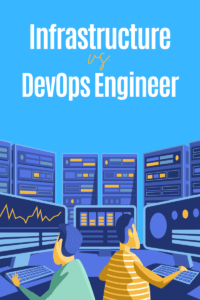

Infrastructure Engineers and DevOps Engineers are crucial in ensuring the seamless operation and continuous improvement of IT systems. Both roles, while interconnected, have distinct responsibilities, skills, and focuses. This article aims to provide a comprehensive overview of these two roles, highlighting their differences and the unique contributions they bring to an organization.
What Does an Infrastructure Engineer Do?
Infrastructure Engineers are the backbone of an organization’s IT framework. They design, deploy, and maintain the IT infrastructure, ensuring that all systems function seamlessly and efficiently. Here are some key responsibilities of an Infrastructure Engineer:
- System Design and Deployment: They design and implement IT systems, ensuring they are scalable, reliable, and secure.
- Maintenance: They maintain internet connections, cabling, virtualization platforms, and storage area networks.
- System Administration: They oversee middleware application servers, such as Oracle WebLogic, IBM WebSphere, and automated workflow tools.
- Technical Leadership: They lead technical teams during major data migrations and ensure high availability of Virtual Desktop Infrastructure (VDI) systems.
Key Skills of an Infrastructure Engineer
Infrastructure Engineers must possess a diverse skill set to handle various aspects of IT infrastructure. Common skills include:
- Python: Used for scripting and automation.
- Cloud Platforms: Knowledge of AWS, Azure, and other cloud services.
- Linux: Proficiency in managing Linux-based systems.
- Networking: Understanding of DNS, IP plans, and LAN connectivity.
- Virtualization: Experience with virtualization technologies to enhance system performance and reliability.
What Does a DevOps Engineer Do?
DevOps Engineers play a pivotal role in bridging the gap between software development and IT operations. They focus on automating and streamlining the software development lifecycle to ensure faster and more reliable software delivery. Key responsibilities of a DevOps Engineer include:
- Code Deployment: They manage code deployments and releases, ensuring smooth transitions between development and production environments.
- Automation: They develop scripts and tools to automate build processes, testing, and deployments.
- Collaboration: They work closely with development and operations teams to foster a culture of shared responsibility.
- System Monitoring: They monitor system performance and troubleshoot issues to ensure optimal functioning.
Key Skills of a DevOps Engineer
DevOps Engineers require a blend of development and operations skills. Common skills include:
- Python: Used for scripting and automation tasks.
- Docker: Knowledge of containerization for efficient application deployment.
- Jenkins: Experience with CI/CD pipelines for continuous integration and delivery.
- Infrastructure as Code (IaC): Proficiency in tools like Terraform and Ansible for managing infrastructure through code.
- Version Control: Expertise in Git for managing code repositories and version control.
Comparing Responsibilities
While both roles involve managing IT infrastructure, their focus areas and responsibilities differ significantly:
- Infrastructure Engineers focus on the physical and virtual components of IT systems, ensuring they are reliable and scalable.
- DevOps Engineers emphasize automating the software development process, integrating development and operations tasks to improve software delivery speed and quality.
Infrastructure vs. DevOps Engineering
Infrastructure Engineering
- Design and Maintenance: Infrastructure Engineers are responsible for the design, deployment, and maintenance of IT infrastructure.
- Focus: Their primary focus is on ensuring the underlying IT systems are robust and capable of supporting business operations.
- Collaboration: They collaborate with various teams to understand infrastructure requirements and design solutions that meet organizational needs.
DevOps
- Automation and Integration: DevOps Engineers focus on automating manual tasks and integrating development and operations processes.
- Cultural Shift: DevOps represents a cultural shift, breaking down silos between development and operations teams.
- Continuous Improvement: They implement CI/CD pipelines, enabling continuous integration, testing, and deployment of software.
Conclusion
Infrastructure Engineers and DevOps Engineers both play essential roles in modern IT environments. While Infrastructure Engineers focus on building and maintaining the foundational IT infrastructure, DevOps Engineers aim to streamline and automate the software development process. Understanding the distinctions between these roles can help organizations effectively allocate resources and foster collaboration, ultimately leading to more efficient and reliable IT operations.
By clearly defining the responsibilities and skills required for each role, businesses can ensure they have the right talent in place to support their IT strategies and drive continuous improvement. Whether you’re an aspiring tech professional or a hiring manager, recognizing the unique contributions of Infrastructure Engineers and DevOps Engineers is key to building a resilient and agile IT ecosystem.
At Fabric Staffing, we are committed to helping organizations unlock their full potential through innovative talent solutions. Contact us to learn more about how we can support your talent acquisition and development needs.